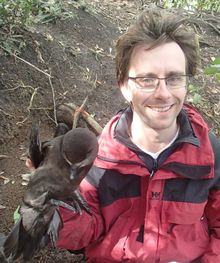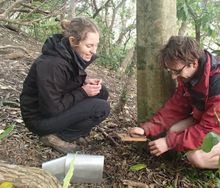
An adult grey-faced petrel returning to its burrow at night on Goat Island, seen at right from the Leigh Marine Laboratory (all images: A. Ballance)
 The University of Auckland’s James Russell (left) holds a joint position in the School of Biological Sciences and the Department of Statistics, and is an Associate Investigator in the Allan Wilson Centre for Molecular Ecology and Evolution. He won the 2012 Prime Minister’s MacDiarmid Prize for Emerging Scientist for his work combining ecology, genetics and statistical modelling to solve conservation problems, particularly around rodents and islands. He’s also very interested in taking what we’ve learnt about achieving successful island eradications and applying them to the much bigger challenge of a Predator-free New Zealand.
The University of Auckland’s James Russell (left) holds a joint position in the School of Biological Sciences and the Department of Statistics, and is an Associate Investigator in the Allan Wilson Centre for Molecular Ecology and Evolution. He won the 2012 Prime Minister’s MacDiarmid Prize for Emerging Scientist for his work combining ecology, genetics and statistical modelling to solve conservation problems, particularly around rodents and islands. He’s also very interested in taking what we’ve learnt about achieving successful island eradications and applying them to the much bigger challenge of a Predator-free New Zealand.
Alison Ballance joins James and masters student Jemma Welch (photographed below setting a rat trap) for a trip to Goat Island, Te Hāwere-a-Maki, in the Leigh Marine Reserve north of Auckland, where they’re combining research into rats and a small population of winter-breeding grey-faced petrels. Goat Island is just 9 hectares, and lies only 50 metres from mainland – as a result ship rats can easily swim across to the island, and although it is possible to remove rats from the island it is soon reinvaded. Jemma and James are trapping rats on the island during the grey-faced petrel breeding season to minimise rat predation on the small chicks, which are left alone in the burrow while both parents forage at sea.
 Grey-faced petrels are one of the indicator species that the Department of Conservation has chosen to focus on its recently developed Inventory and Monitoring Framework (PDF), being used to measure progress towards biodiversity targets. They have selected 106 taxa as a minimum set to adequately represent the full range of taxonomic groups, pressures and habitat types found in New Zealand.
Grey-faced petrels are one of the indicator species that the Department of Conservation has chosen to focus on its recently developed Inventory and Monitoring Framework (PDF), being used to measure progress towards biodiversity targets. They have selected 106 taxa as a minimum set to adequately represent the full range of taxonomic groups, pressures and habitat types found in New Zealand.

